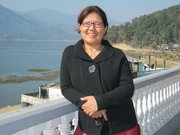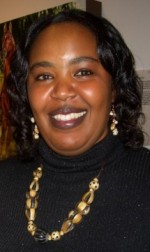Women Rising Radio Program XIII: Enterprising Women
 LUCKY CHHETRI: In Nepal where tourism is one of the biggest sources of income, Lucky Chhetri is literally a trail blazer. Lucky became one of the first women trekking guides in a business that was reserved for men, and she and her two sisters started the very first women’s trekking guide company in Nepal, The Three Sisters Adventure Trekking Company. The sisters also started an NGO, Empowering Women of Nepal, to train women from remoterural mountainous areas of Nepal – so they could also work as trekking guides, and make good money for their families. Lucky herself trained in the Himalayan Mountaineering Institute in Darjeeling, India. She and her sisters started a restaurant in the foothills of Nepal, and the trekking company came shortly after that. Once, Lucky was on a trek with a group and they had stopped for afternoon tea. Suddenly they were surrounded by Maxist guerrillas and one of the guerrillas, holding a gun, said to her, “You are Lucky Chhetri, aren’t you?” She was shocked. She said, “Yes I am.” And he responded, “You are great, you are giving opportunity for the rural women of Nepal. Thank you…” How’s that for success?
LUCKY CHHETRI: In Nepal where tourism is one of the biggest sources of income, Lucky Chhetri is literally a trail blazer. Lucky became one of the first women trekking guides in a business that was reserved for men, and she and her two sisters started the very first women’s trekking guide company in Nepal, The Three Sisters Adventure Trekking Company. The sisters also started an NGO, Empowering Women of Nepal, to train women from remoterural mountainous areas of Nepal – so they could also work as trekking guides, and make good money for their families. Lucky herself trained in the Himalayan Mountaineering Institute in Darjeeling, India. She and her sisters started a restaurant in the foothills of Nepal, and the trekking company came shortly after that. Once, Lucky was on a trek with a group and they had stopped for afternoon tea. Suddenly they were surrounded by Maxist guerrillas and one of the guerrillas, holding a gun, said to her, “You are Lucky Chhetri, aren’t you?” She was shocked. She said, “Yes I am.” And he responded, “You are great, you are giving opportunity for the rural women of Nepal. Thank you…” How’s that for success?
JANE KUNYIHA: Worldwide, many enterprising women have partnered with organizations to develop micro-business projects that will support women and families, and will build communities locally. Kenyan Jane Kunyiha is one of those enterprising women. She chose to work with a project originated by a US donor, called The Baobab Project. It is named after the Baobab tree, which grows in the driest environments of Kenya and Africa. The Baobab tree begins very small but can become huge, extending its roots deep into the earth to connect with deep springs. If you scratch its back, it gives you water! And it gives fruits eaten by humans and many animals. Jane has been on staff with The Baobab Project which gives micro-grants to help women start small businesses. It works in schools, in prisons, and with nomadic communities, to give girls and women new-found independence by training them in business and life skills. Jane has now moved on to work in other sectors of women’s economic development.
 BRIGITTE KITENGE: Born and raised in Rwanda, Brigitte Kitenge suffered through the horrible war there. She was a victim of the violence, and she saw other women and girls raped, killed and tormented. She managed to escape to the Democratic Republic of the Congo, only to find that war had followed her there. She was among those attacked in DRC. She recalls that time of horror with stinging clarity. A Christian, Brigitte credits a group of Muslim women with helping her to come back to living in the world. She joined with them to begin sewing…creating napkins and table cloths, and other goods that could be sold to bring in income, and to feed their families. They didn’t have any sewing machines so everything had to be done by hand. When Brigitte got out of the DRC and came to the US with her family, she raised her children, put herself through school and earned a Ph.d. Then she decided to start a microfinance project to bring sewing machines to the women who helped her. Her project became much larger, and she calls it Future Hope For Women.
BRIGITTE KITENGE: Born and raised in Rwanda, Brigitte Kitenge suffered through the horrible war there. She was a victim of the violence, and she saw other women and girls raped, killed and tormented. She managed to escape to the Democratic Republic of the Congo, only to find that war had followed her there. She was among those attacked in DRC. She recalls that time of horror with stinging clarity. A Christian, Brigitte credits a group of Muslim women with helping her to come back to living in the world. She joined with them to begin sewing…creating napkins and table cloths, and other goods that could be sold to bring in income, and to feed their families. They didn’t have any sewing machines so everything had to be done by hand. When Brigitte got out of the DRC and came to the US with her family, she raised her children, put herself through school and earned a Ph.d. Then she decided to start a microfinance project to bring sewing machines to the women who helped her. Her project became much larger, and she calls it Future Hope For Women.
RASHMI DIXIT: Growing up in Maharashtra province in India, Rashmi Dixit spent her college days trying to figure out how to integrate farming, ecology, women’s rights and traditional Indian culture. A tall order. But when this young woman had earned her degree, she struck out for the inner reaches of India to try out some of her ideas. She went to work with the Adivasi tribal people, forest dwellers who had traditionally lived on millet, forest tubers, fruits, mushrooms, fish and a few green vegetables that they cultivated. Their staple grain was minor millet. But then capitalism hit them like a sledgehammer, forcing them into the trap of cultivating cash crops like rice, tea and coffee. The women of the community did 80% of the farming but had no say in the decisions of what to grow, how to grow it etc. They told Rashmi that if they tried to grow millet instead of rice – millet being much healthier for their children than rice – their husbands would kill them (literally). So Rashmi decided she needed to create a market for millet and other traditional Adivasi foods. She created the Indigenous Cuisine Corner restaurant….brilliant! The women had to have access to millet and all the good things that helped their kids to be healthy, they made lots of money with the restaurant, and their husbands could lord it over them with the customers… an ideal solution to all the problems.

